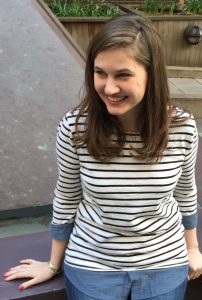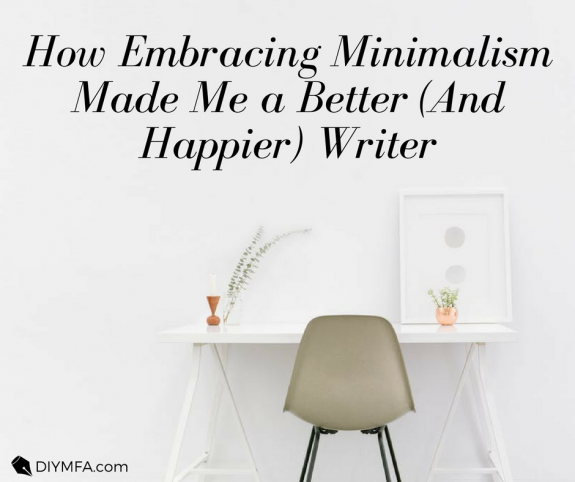Last month, I wrote about minimalism, and how I thought the lifestyle might have particular value for writers. I planned to take the month of March to experiment with de-cluttering and embracing a more minimalist lifestyle in my home and on my computer. A month and many, many trashbags later, I’m still not quite done with the de-cluttering process, but I’m already beginning to experience what Marie Kondo calls, “The life changing magic of tidying up.” Embracing some minimalist principals and, of course, tailoring them to my own lifestyle, has already had a positive impact on my creative life.
I tried to write a follow-up article that summed up all my thoughts on the matter, and found 1,000 words woefully inadequate. So, I’ve decided to extend this series to a few more articles. I think the principals of minimalism can have a positive impact on writers. For this initial follow-up, I’d like to talk about three things I’ve gained creatively by discarding the majority of my stuff.
1) A Greater Understanding Of What Matters to Me
I often live my life in a state of pure reaction, putting out fires and not able to prioritize at all. It’s hectic, unhealthy and, ultimately, unproductive. I think this is a reality for a lot of writers, and a perfect example of why minimalism is so applicable to us. It can be really easy to lose sight of our priorities because we’re juggling a lot of obligations in addition to writing. 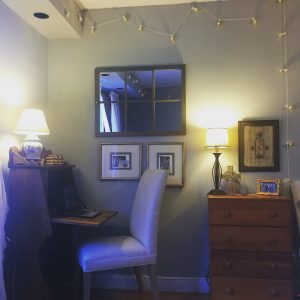
Going through all of my belongings, and saving only those things that are useful or bring me joy forced me to examine what I actually value. It forced me to question whether my daily habits–begun, of course, in my living space–were a reflection of what was truly important to me. By picking up each item I owned and deciding whether it reflected what I actually want, I was able to refine my own understanding of my values and, in the process, set up a space that reflects them.
For example, I decided that it was important for me to have a desk in my room (I’d thrown my previous one out). At the same time, it’s important for me to be frugal. By swapping some furniture with my roommate, I was able to set up a small writing nook. I decided I would only use this desk for writing, and would keep it clear of excess clutter. The result? I have a dedicated space for the work that is most important to me–it’s useful and pretty, and brings me lots of joy!
2) Focus on the Present Project
I recently wrote an article about revising a trunk novel. A lot of writers have at least one or two. And, in addition to massive amounts of files on my computer, I had piles of drafts, notes, maps and inspiration pictures from old manuscripts. It was a disorganized mess, shoved into binders, and stuck on a shelf. I’d never be able to go through them all, but have always been scared of discarding them. What if I wanted to revise one of those books one day?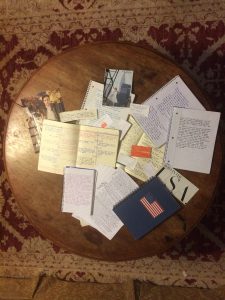
In going through all of my belongings, I decided I had to go through these as well. It forced me to question why I was keeping so much stuff from each book. If I ever came back to them, did I really need a hard copy of drafts four, five and six of the old version? Didn’t I have all of these digitally? I did a quick search of my laptop to see whether I did, in fact, have a final copy of each book. In one case, I didn’t! It was on my laptop from college. This made me realize just how disorganized my files were.
It took an entire weekend, but I consolidated and organized all my files from three computers onto one. I printed each manuscript (hey–what if the zombie apocalypse happens?), and discarded every other draft, saving only the hand-written notes. In the end, I recycled four trashbags full of paper, gaining a clean, aesthetically pleasing bookshelf, and the peace of mind that comes from knowing exactly where all my notes, drafts and manuscripts are.
But the bigger benefit, in this case, wasn’t getting more space on my bookshelf. After I had consolidated all my files to one computer, I moved all the old ones–for every trunk novel, high school paper, college essay, photos, everything–off my laptop and onto a USB drive. The laptop I use every day now has only the drafts, notes and files necessary for the project I’m currently working on. I hadn’t realized how much those past manuscripts were weighing on my mind. Now, I know exactly where they are if I need them, but I can let them go and focus on my current project for the time being. By freeing up my physical and digital spaces, I’ve freed up my mental space as well. It also made my computer run faster!
3) Less Decisions=Less Stress
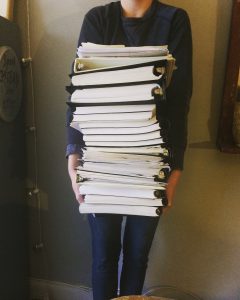
Part of the “throw away” pile.
Going through my possessions forced me to confront what I value, and helped me set up a space that reflects that. But I’ve also found my day-to-day life improved by this simple fact: I don’t have to make a lot of decisions because I don’t have a lot of options, and I’ve already determined what’s important.
For example, I love fashion and putting together outfits, but also understand that this can be a source of stress and a time-suck in the morning. It involves checking the weather (thus, getting on my phone) and making decisions (which are naturally draining). The morning is when I write and I don’t want anything disturbing that focus. So, I decided to try picking out my outfits at night. To help, I got an old ladder and used it as a set up shelf. The result? A more peaceful morning and a clearer head.
I’ve set up my room for the things I value: I have a writing nook, a reading nook, and space to throw down a yoga mat. I have a drawer specifically for my phone, so that I can turn it off and put it away, thus shutting off email, social media and the news in the process. I know every piece of clothing in my closet. My needs are fewer, and my values clearer, so I’m able to make decisions–say, about going out to lunch, or buying the skirt I see in a window sale–with more confidence and ease.
So what does this last part have to do with writing? Less stress means more focus, which–especially in today’s cluttered, digitally driven world–is invaluable for an artist. In fact, I think time and focus are two of the most valuable things we have. Embracing minimalism has given me more of both.
Next time, I’ll be talking about how I went about this process, what worked, and what didn’t. Have a question? Let me know in the comments!
